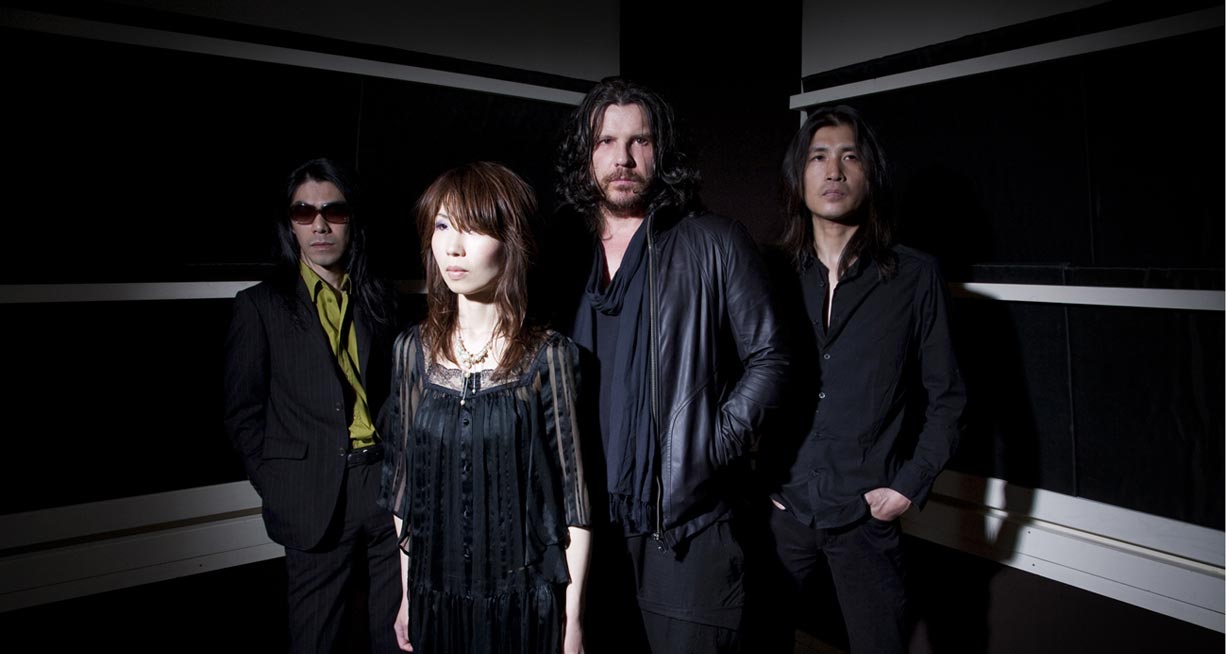Boris & Ian Astbury: “We Are Witches”
Boris & Ian Astbury: “We Are Witches”

In 1964, media theorist Marshall McLuhan wrote, “As electrically contracted, the globe is no more than a village.” He was a bit off when it came to how peaceful this village would be, but culturally and musically, he may have been onto something. As geographical boundaries fall away and new systems of communication become as sophisticated and ubiquitous as speech, we can look forward to a world in which Ian Astbury of The Cult can write songs with Japanese drone rockers Boris.
On the surface, it is the strangest of pairings: a man more familiar for his work with post-punk and hard rock, singing in a guttural heave to Boris’ wall of distortion and endless drum fills. In reality, behind this four-song EP, titled BXI, is a group of individuals intent on being “very fucking serious,” according to Astbury, about the music they make. The unforeseen collaboration features Astbury’s growl on three originals, as well as a cover of The Cult’s “Rain,” where Boris’ Wata takes over vocal duties.
The men behind Southern Lord, Greg Anderson and Stephen O’Malley, facilitated the meeting between these disparate entities. According to Astbury, “Steven met me and kind of vetted me. Then he spoke of me with Boris, and the next thing I know, the material starts coming.” The meeting was nearly two years in the making according to Astbury, who originally wanted Boris to perform with The Cult. Instead, BXI showcases Boris’ ability to write for an iconic front man.
“Do you understand why 15-year-old boys are screaming into microphones and not singing? Because nobody’s fucking listening to them. Do you think that they’re taking the way this culture is, and they’re not affected by it emotionally? Absolutely, they’re fucking affected by it.”
“I really feel like I’m around my people, my tribe,” Astbury says of the collaboration and of working with Southern Lord, “and it’s just great to be in a room with people when I’m speaking the language and they understand it.”
“After Ian joined in the session,” Atsuo of Boris says, “we headed for a specific possibility that couldn’t be seen by Boris alone.” At this point, however, the genre-straddling three-piece must be well attuned to collaboration, and its acumen has grown with every release. Boris has worked with the likes of Michio Kurihara, Merzbow, Haino Keiji, and Sunn O))), and each time, Boris discovers a latent connection between its members and its collaborators. This connection is where its brand of doom-laden hard rock blends effortlessly with the experimental vocal wails of Haino or the psychedelic styles of long-time collaborator Kurihara. Indeed, BXI sounds so natural after a few listens that it’s difficult to see how the collaboration ever seemed strange.
Astbury is equally familiar with the collaborative process. He performed with UNKLE, fronted The Doors in 2002, played with MC5 a year later, and continues to bring what he has experienced and learned back to The Cult. “I’ve been at these other universities studying with these other masters,” Astbury says. “I want to bring this into whatever I’m doing. They say you can’t teach an old dog new tricks. I think that’s bullshit.”
Lyrically, Astbury comes to terms with a few troubled years on BXI. The death of close friend and cinematographer Sean Watts led him to a reclusive artistic period that ended when he was given the collaboration with Boris.
“I basically threw in the towel at that point,” he says. “I really crawled out of a hole, so I had a lot of material to work with. I was wounded. I was hurt. In the past eight months, I’ve been really getting back on my game. The first thing I get given is Boris, and that was just overwhelming.”
Astbury says that Norwegian black metal has equally become a strong influence for him, personally and lyrically. That influence stems from what he describes as an attunement to nature, sensitivity, and experience within the Norwegian black-metal scene, which, as he says, turns anyone involved into willing outsiders of a materialistic culture.
Change “Norwegian black metal” to “British post-punk” in the previous paragraph, and the same words could easily be applied. “Bands talking more about feeling, not a part of society — this dystopian quality — that’s always permeated the things I’ve done,” Astbury says Though sonically disparate, the post-punk movement, where Astbury first entered the music world with Sudden Death Cult, had in it some of the same dissatisfaction and anger as Norwegian black metal. Both movements came about as an attempt by the counterculture to revenge itself against mainstream influence that didn’t satisfy emotionally or spiritually.
“Do you understand why 15-year-old boys are screaming into microphones and not singing?” Astbury asks. “Because nobody’s fucking listening to them. Do you think that they’re taking the way this culture is, and they’re not affected by it emotionally? Absolutely, they’re fucking affected by it.”
This may be why through most of BXI, Astbury belts out his delivery, forcing the listener to pay attention. Yet despite the existential and emotional import behind Astbury’s words, BXI stays within the realm of fist-pounding raucousness throughout, with the exception of the final track, “Magickal Child,” which combines the doom qualities of “Rafflesia,” the first track on Boris’ Rainbow, with the peerless, vibrato-heavy vocals of Astbury.
It’s an ending that encapsulates where the singer was emotionally before the project, and equally, the ability of Boris to recognize and perfectly match Astbury. “The forest knows just how you feel / In higher form, you shall be reborn,” he sings. The natural world that Astbury sees as an integral part of black metal is the world he tries to embrace and pull into BXI. With the help of Boris, it’s a fully realized vision—heavy, cathartic, and entirely unapologetic.

